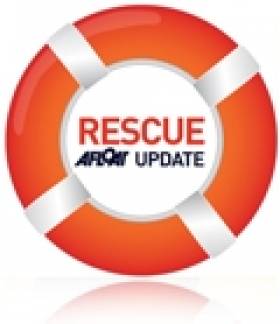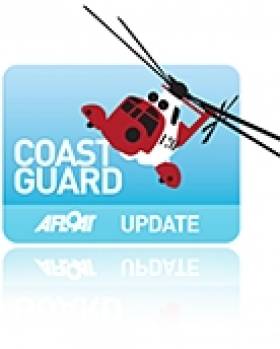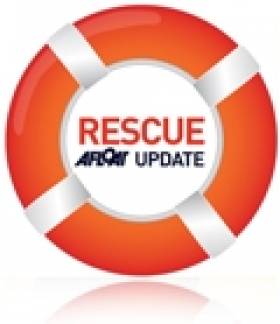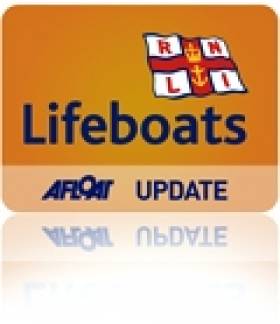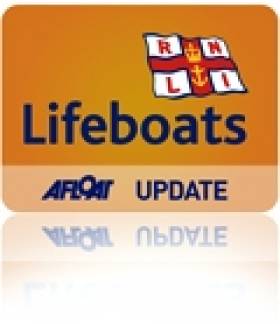Displaying items by tag: Volunteer
Thieves Take Engines from Volunteer Rescue Unit
#RESCUE - The Killaloe/Ballina Search and Recovery Unit in Co Clare has been left reeling after the engines powering its specialist dive boat were stolen recently.
According to the Irish Examiner, the 18-strong volunteer search team were "gutted" when they turned up for training on Wednesday to find thieves had broken into the boathouse and made off with two 90HP Honda engines, worth €15,000 each.
Chairman Tony O'Brien commented: "The boat is well marked and clearly identifiable so whoever took these engines knew what they were taking and that they were stealing from a volunteer community group."
O'Brien described the theft as a "sick act" and emphasised that "lives are being put at risk".
Anyone who might have information regarding the theft is urged to contact gardaí in Killaloe at 061 620540 or the Garda confidential line at 1800 666 111.
The Irish Examiner has more on the story HERE.
Seven New Coast Guard Boats in €2M Safety Programme
€1.5 million has been allocated for 7 new Coast Guard boats as part of its boat renewal programme;
€300,000 will be used to purchase new vans for the Coast Guard's volunteer rescue teams;
€200,000 will be used to update the Coast Guard's pollution response equipment to best international standards.
Separately, Minister Varadkar is backing an Irish Coast Guard initiative to have a new European Coast Guard Secretariat based full-time in Dublin.
Speaking today, Minister Varadkar said: 'I'm very happy to allocate extra resources to the Coast Guard to upgrade its vital equipment, including seven new boats, along with replacement vans and pollution control materials. One of the new Rigid Inflatable Boats (RIBs) has been allocated to Achill Coast Guard, and the remainder will be allocated to Coast Guard Stations around Ireland over the next 12 months, according to priority.
"Everyone who goes to sea owes a debt of gratitude to the Coast Guard, as do their family and friends. The Coast Guard responds to emergency call-outs, and saves lives, at all hours of the day and night, throughout the year. Much of the Coast Guard's work is only possible through the large network of individual and group volunteers."
Minister Varadkar also congratulated the Director of the Irish Coast Guards, Chris Reynolds, who has been elected the new Chair of the European Union Heads of Coast Guard. The annual Heads of Coast Guards of Europe's meeting will now take place in Dublin next August.
Mr Reynolds has been asked specifically to prepare the ground for a permanent Secretariat, manned by Coast Guard Officers from Member States, the EU Commission and various agencies. The Secretariat will meet in Dublin for its inaugural year, and Mr Reynolds will propose to have the Secretariat based in Dublin on a permanent basis.
Additional info:
New Delta 900 SUPER X RIBs for Irish Coastguard
The Irish Coastguard's new Delta 900 SUPER X Coast Guard RIBs are 9.00m overall and will be in service off the Republic of Ireland's coast.Jun 07, 2011 - From its early days in 1979, the Delta Power Group (builder of Delta RIBs) has grown to become one of the most successful and highly regarded designers and builders of commercial RIBs for the world market.
This enviable position has been achieved through a simple business philosophy. Delta has not burdened itself with debt to fuel growth, preferring to expand organically by concentrating on contracts that remain strictly within its targeted commercial sector, winning business from successful organisations; which in turn generates repeat orders and new contacts.
A recent Irish Coastguard contract is not for just one craft; but covers a five year programme to supply 12 highly specified boats. Delta's Military and Law Enforcement range comprises nine models and these are offered with different specifications depending on usage.
The Irish Coastguard's new Delta 900 SUPER X Coast Guard RIBs are 9.00m overall and will be in service off the Republic of Ireland's coast. Twin Yamaha F225B engines give a maximum speed of 40 knots and a cruising speed of 32 knots. Safety equipment is to MSO P6 Passenger Boat and other equipment is to MCA Category 3 rating. The extensive specification includes Shockwave mitigating seating for all the crew. And it also features Delta's standard procedure of terminating all wiring looms in fully waterproof housings with Deutsch connectors to ensure maximum in service reliability; essential, since the Irish Sea and Atlantic Ocean can throw up very demanding operational conditions.
In addition, Delta is one of the few major Commercial RIB builders to run the processes of laminating, tube making and outfitting completely 'in house' (on its wholly owned and secure 2.2 Acre freehold site) in 79,000 sq.ft of covered space. This ensures maximum Management and Quality Control. Delta is certified to ISO 9001: 2008 and is able to build under full survey of all the major Classification Societies.
As a result, Delta's extensive international client base now includes ERRV, Marine Police, Border Control, Customs & Excise, Navies, Special Forces, Coastguards, Search & Rescue services, Law enforcement agencies, Military and Port Authorities; to name just a few.
Children Rescued From Co Down Waters
Four teenagers were rescued in Co Down last weekend when they were cut off by the tide, the News Letter reports.
The teens were caught up to their shoulders in water at Ardilea on Saturday evening when they were retrieved by a former volunteer coastguard who lives nearby.
The group were met at the shore by the South Down Coastguard Rescue Team and NI Ambulance Service paramedics and taken to hospital showing signs of hypothermia.
Meanwhile, on Friday night RNLI Bangor lifeboat rescued a young girl stranded on a rock near Groomsport after a call from a member of the public.
“With waves breaking around the knees of the frightened child it was paramount that she be brought ashore as quickly as possible," said a coastguard statement.
The girl was treated by waiting paramedics at the shore.
The 'National Awards to Volunteers in Irish Sports', held at the Aviva stadium celebrated the contributions of volunteers to Irish sport.
There are over 400,000 people throughout the country who voluntarily dedicate their time every year through their involvement with sports clubs and organisations. 250 volunteers were shortlisted, and Dun Laoghaire's Brian Craig was one of only eleven to receive the award from the Minister.
The national awards are an initiative of the Department of Transport, Tourism & Sport in conjunction with the Federation of Irish Sports, which represents some 68 sports in Ireland. The scheme is also supported by the Community Foundation of Ireland and the Irish Sports Council.
Attending the ceremony with Brian and his family was Irish Sailing Association (ISA) President, Niamh McCutcheon.
The award winners were selected by a committee chaired by Olympic Gold Medal Winner, Ronnie Delany, alongside representatives from the Federation of Irish Sports, Irish Sports Council, The Irish Times, RTÉ and the Department of Transport, Tourism & Sport.
Speaking at the presentation of the awards Minister Ring said. "The contribution of volunteers in supporting Irish sports people at every level, from when they first engage in sporting activity right through to developing elite athletes, should not be underestimated. Indeed, the army of volunteers who dedicate their time and commitment to each sport in Ireland assist in building strong and healthy communities, while giving everybody the opportunity to be the athletes they are."
"In presenting these awards today I wish to not only congratulate the 11 volunteers who truly deserve their honours, but I would also like to acknowledge all of the 400,000 people who help to ensure Irish sport is in such a healthy state. Quite simply sport in Ireland wouldn't function without their incredible efforts, and as a nation we would undoubtedly be worse off."
Donation for Bangor Lifeboat Crew
RNLI Bangor's volunteer lifeboat search and rescue crew were pleased to receive a donation of £500 from the Bangor Marina Berth Holders Association this week.
Association chairman Martin Wilson said: "Every year our members raise funds for various local nautical charities and this year we decided that the RNLI Lifeboat at Bangor would be one of our worthy causes."
Bangor RNLI operations manager Kevin Byers said that the RNLI "is always grateful to receive funds, being a charity we are totally reliant on suchdonations. It allows us to provide 24-hour emergency cover and to continueto save lives at sea."
He added: "I would like to thank the Bangor Berth Holders Association for their support."
Dramatic Photos of Clifden Lifeboat Battling Surf
John organised the training in response to the increased popularity of the area with surfers. RNLI Divisional Assessor Trainer Helena Duggan travelled to the lifeboat station to put 18 volunteer lifeboat crew through their paces and train them in handling the lifeboat in surf and responding to potential callouts from leisure marine enthusiasts.
Training is a core part of volunteering with the RNLI and each crewmember in Clifden trains once a fortnight on the stations two inshore lifeboats.
Commenting on the exercise John said, "I took my camera down to photograph the exercise and was really pleased with the results. It is great to be able to show the public what our lifeboat volunteers go through to ensure they are fit and trained to go to sea. We had a fantastic turnout on the day and the lifeboat crew learned about boat handling in surf conditions. We are delighted so many people are visiting the area for leisure marine activities."
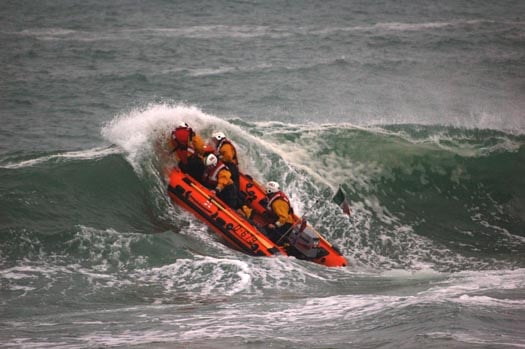
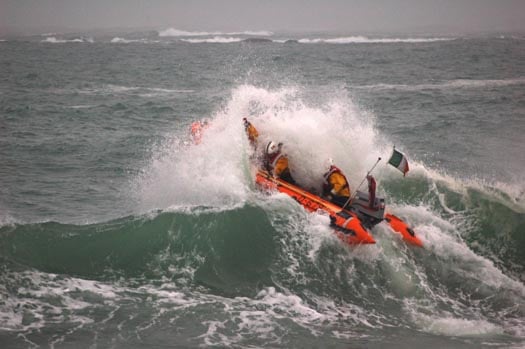
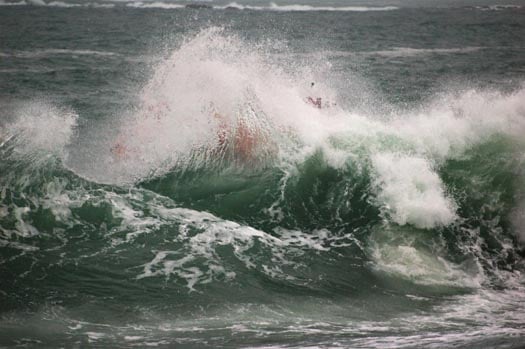
Photos by John Brittain/Clifden RNLI show Clifden volunteer lifeboat crew with RNLI Training assessor Helena Duggan during surf training on Dunloughan beach, Ballyconeely
Related Safety posts
RNLI Lifeboats in Ireland
Safety News
Rescue News from RNLI Lifeboats in Ireland
Coast Guard News from Ireland
Water Safety News from Ireland
Marine Casualty Investigation Board News
Marine Warnings


























